Researchers Dr. Mar Gutiérrez-Colón and Jonathan Pidgeon-Hancock are developing the first official adaptive English proficiency test for people with intellectual and developmental disabilities (IDD) to CEFR standards. The test is being developed in collaboration with the Universitat Rovira i Virgili, Fundació Onada and the Generalitat de Catalyuna through the Doctorats Industrials program. The test aims to foster obtainable access to English language certification for adult jobseekers with IDD. Encountering work for this demographic already poses difficulties, therefore any additional support is key. In 2022 in the EU, 51% of working-aged people with disabilities were employed, compared to 75% of people without disabilities (Eurostat, 2022). The European Commision has laid out “the Strategy for the Rights of Persons with Disabilities 2021–2030” to narrow this employment gap (European Commision, 2024). With constant advancement of technology and globalization in business, it is important for individuals in the workforce to acquire skills to be prominent in this concern. The role of English in business, makes it a sought-after skill by employers. In 2021 the Organization for Economic Co-operation and Development (OECD) studied the demand for language skills in job-postings. Data was analysed from online job-vacancies in 27 member countries. Command of English was explicitly required in 22% of job-vacancies. Evidence indicated that although Europe remains a linguistically diverse labour market, knowledge of English grants unique advantages in certain occupations. An English proficiency certification is a beneficial addition to anyone’s curriculum vitae, and our test will help facilitate obtainable access to jobseekers with intellectual and developmental disabilities.

RUNNER-UP
Impactful Research of the Year Award
English Proficieny Test for TFL SEN students
RUNNER-UP Impactful Research of the Year Award
Universitat Rovira i Virgili - Spain
"Empowering Potential, Bridging Opportunities"

Engage on social media
(Official URV Twitter account)
(Research Group in language and technology)
(Mar Gutiérrez-Colon’s Twitter)
(Official URV LinkedIn account)
(Official Fundalis LinkedIn account)
(Mar Gutiérrez-Colón Plana’s LinkedIn account)
(Jonathan Pidgeon’s LinkedIn account)
(URV’s Facebook)
(URV’s Youtube)
Summary
Key People

Mar Gutiérrez-Colón Plana
Professor
Department of English and German Studies,
Universitat Rovira i Virgili

Jonathan Michael Pidgeon-Hancock
English Teacher/ Doctorate Industrial.
Department of English and German Studies. ,
Universitat Rovira i Virgili
Acknowledgements
We would like to extend my heartfelt gratitude to Industrial Doctorates (https://doctoratsindustrials.gencat.cat/en/ ) a programme of the Department of Research and Universities of the Generalitat de Catalunya for their invaluable support and funding, which made this project possible. Their commitment to fostering innovative research and development has been instrumental in our success. Additionally, we wish to acknowledge Fundació Onada (https://www.fundacioonada.org/ ) in Tarragona and Torredembarra for their unwavering partnership and support. Their dedication to improving the lives of individuals with intellectual disabilities has been a cornerstone of our project's implementation and impact. Without these vital contributions, our achievements and the positive changes in our students' lives would not have been possible. Thank you for believing in our vision and helping us make it a reality
Images
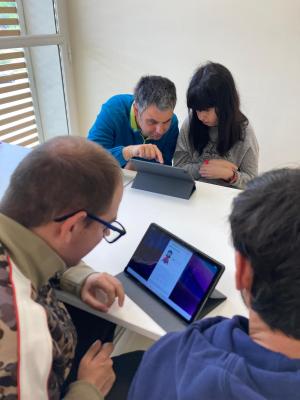
Image 1
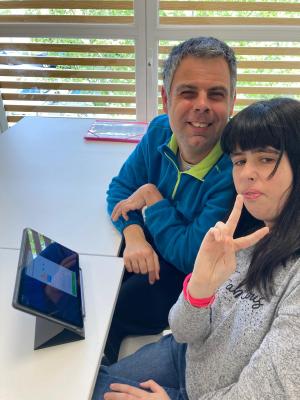
Image 2
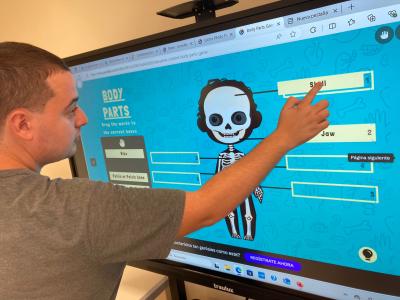
Image 3
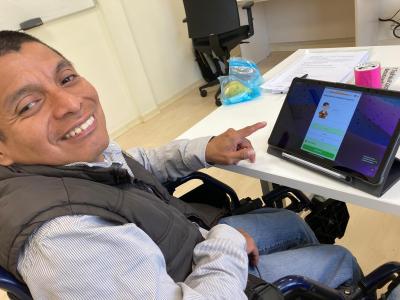
Image 4
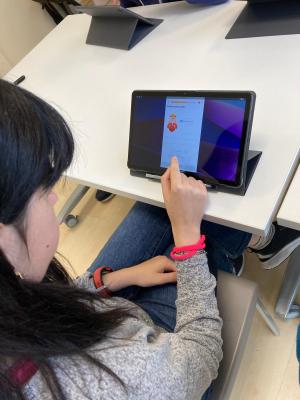
Image 5
IMPACT STORY
Impacting lifes
One of the most heartwarming impacts of our English language classes for students with intellectual disabilities has been witnessing their transformation in both confidence and ambition. Ana, a young woman with a mild intellectual disability, joined our program with a basic understanding of English but a strong desire to improve. Initially shy and reserved, Ana struggled to participate in class. However, with the support of tailored teaching methods and the use of engaging multimedia tools, she began to thrive. Her progress was not only in her linguistic abilities but also in her self-esteem and social interactions.
Ana's journey reached a significant milestone when she expressed her eagerness to take the English proficiency test we were developing. For her, this was more than just an academic assessment; it was a chance to validate her hard work and open doors to new opportunities. This certificate will become a pivotal part of her resume, showcasing her language skills to potential employers.
We hope Ana will be employed at any local company that values her bilingual abilities. Her story can be a testament to the transformative power of education tailored to individual needs and the profound impact it can have on students' lives. It highlights the importance of inclusivity in education and the tangible benefits that come with providing equitable learning opportunities
LEARNINGS
Lessons learned
Having been selected as a finalist for the Triple E-Awards is a testament to the impact and innovation of our project. One of the key learnings from this endeavor has been the surprising adaptability and engagement of students with intellectual disabilities when provided with appropriately tailored resources and methodologies. Implementing technology, particularly through Computer-Assisted Language Learning (CALL) revealed that these students could achieve significant improvements in their English language skills. This was contrary to the common expectation that such interventions might have limited efficacy due to the cognitive challenges faced by these learners.
For those aspiring to undertake a similar path, it is essential to emphasize the importance of customization and inclusivity in educational design. Developing materials that cater to the specific needs and preferences of the target group is crucial. This involves not only adapting content but also ensuring that the delivery methods are engaging and accessible. Additionally, fostering a collaborative environment with continuous feedback from both learners and educators can significantly enhance the effectiveness of the intervention.
Leadership in this field requires patience, empathy, and a willingness to innovate continuously. It is important to challenge preconceived notions about the capabilities of individuals with disabilities and to push the boundaries of conventional educational approaches. By doing so, we can create a more inclusive and equitable learning environment that empowers all students to achieve their full potential.
FUTURE PLANS
What's coming?
As we look to the future, our primary focus is on broadening the impact and accessibility of our innovative language proficiency test for individuals with intellectual disabilities. Our immediate goal is to finalize the digital format of the English level test and ensure its integration into the URV Language Services for standardized certification. This will enable individuals with intellectual disabilities to obtain a recognized certification of their English skills, greatly enhancing their employability and opportunities in the labor market.
We are committed to robust dissemination strategies, both online and offline, to maximize the reach and impact of our work. This includes participating in relevant fairs and conferences, engaging with educational and governmental bodies, and utilizing social media platforms to build a community around our initiative. Our aim is to foster greater awareness and adoption of inclusive educational practices across Europe and beyond.
In the long term, we envision collaborating with international examining organizations to adapt and expand our testing model to other languages and contexts, ultimately contributing to a more inclusive and equitable global education system. Through continuous innovation and collaboration, we strive to make significant strides towards inclusivity and accessibility in language education

